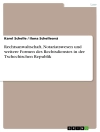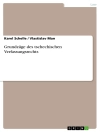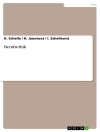This volume presents research on current trends in chemical regulations – a fa- growing, complex, and increasingly internationalized field. The book grew out from a multidisciplinary research project entitled ‘Regulating Chemical Risks in the Baltic Sea Area: Science, Politics, and the Media’, led by Michael Gilek at Södertörn University, Sweden. This research project involved scholars and experts from natural as well as social sciences, based at Södertörn University, Swedish Royal Institute of Technology (KTH), Karolinska Institutet, and Umeå University. The project group organized a multidisciplinary research conference on chemical risk regulations, held in Stockholm, August 15–17, 2007. Most of the contributions published in this book were, in draft form, first presented at this conference. The conference, like the ensuing edited volume, expanded the geographical focus beyond the Baltic Sea area to include wider European, and to some extent also global trends. Many thanks to all project colleagues and conference participants! We are very grateful for the generous financial support received from The Foundation for Baltic and East European Studies (Östersjöstiftelsen), The Swedish Research Council Formas, and from Södertörn University. Without this support the present book would not have been possible. Special thanks to all of our fellow contributors, all of whom have submitted to- cal papers based on high-quality research. Many thanks also to Tobias Evers, who assisted us with technical editing. Finally, we are grateful for the professionalism shown by our editors at Springer.
Tabella dei contenuti
Chemical Risk Assessment and Risk Communication.- Risk Governance: Contemporary and Future Challenges.- Communicating Chemical Risks: Beyond the Risk Society.- Framing Chemical Risks in Sweden and Poland: Journalists’ Narratives and Media Texts.- REACH: What Has Been Achieved and What Needs To Be Done?.- Improving the Value of Standard Toxicity Test Data in REACH.- Testing in Aquatic Ecotoxicology: What Are the Scientific Conditions for the ‘3R’ Concept?.- Chemical Risk Assessment in Toxicological Perspective.- Occupational Exposure Limits in Comparative Perspective: Unity and Diversity Within the European Union.- Scientific Uncertainty and Science-Policy Interactions in the Risk Assessment of Hazardous Chemicals.- Assessing Chemical Risks: Evaluating Products Rather than Substances, and the Case of Anti-fouling Paints.- Chemical Regulation: Politics, Policy and Management.- Global Trends in Chemicals Management.- Regulating Chemical Risk: REACH in a Global Governance Perspective.- The Precautionary Principle in EU and US Chemicals Policy: A Comparison of Industrial Chemicals Legislation.- Chemical Regulations in Central and Eastern Europe: The Pull of Transnational Markets and Associations.- Capacity Building for Chemicals Control: Legislation, Institutions, Public–Private Relationships.- Scientific Committees and EU Policy: The Case of SCHER.- Implementing Chemical Regulation: The Role of Inspectors.- Conclusion.- Regulatory Futures in Retrospect.












